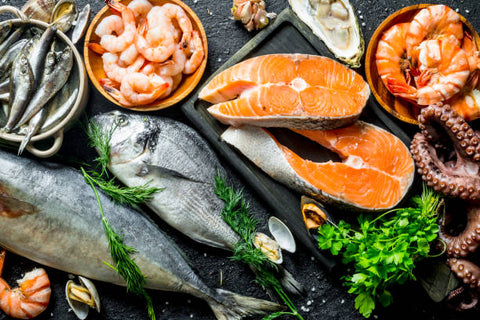Seafood and meat are packed with many nutritional benefits for our overall health. Still, despite how healthy it is, people make the mistake of overlooking the benefits of seafood in favor of meat. But is seafood healthier than meat, and what sets them apart?
A large part of the American population consumes more meat than fish, and while meat is a protein source, overconsumption has too many risks. Fish and seafood are excellent healthy protein sources, so we aim to bring them to the attention of more Americans.
Keep reading as we are about to help you understand how seafood is better than meat for your health!

Is Seafood Healthier Than Meat
As experts and enthusiasts in the seafood industry, we can safely say that seafood is the healthiest protein as it is an incredibly nutrient-dense food. The low fat, high protein content makes seafood healthier than meat. This is especially true about red meat.
According to a Harvard study, red meat is associated with heart disease, type 2 diabetes, stroke, and certain cancers. In contrast, seafood is highly beneficial for our long-term health.
Research shows strong evidence that seafood plays a crucial role in brain, eye, and heart health improvement. According to the Dietary Guidelines for Americans (DGA), Americans of all ages should eat more seafood.
The DGA says all Americans should eat fish at least twice a week. We aim to provide easy access to seafood as we understand the benefits of making it a significant part of our diets.
Sustainability is a big part of our production, including measures against overfishing, environmental impacts, and climate change. At KnowSeafood, we offer only sustainably caught and aqua-farmed seafood products.
Can I Replace Meat with Seafood
Eating fish not only helps with your long-term health, but it also helps reduce your carbon footprint.
Sustainability, coupled with the numerous health benefits, are excellent reasons to introduce more seafood into your diet. As a protein source, seafood is much leaner than meat, meaning the fat content is lower, and thus, it contains fewer calories.
As we mentioned previously, the benefits of seafood are well-researched. Not only will you reduce your intake of saturated fats, but you will also get to explore exciting new flavors.

Which is Healthier, Seafood or Chicken?
Seafood and chicken are considered healthy protein sources. But while both chicken and fish are high in protein and low in carbs, seafood may offer additional health benefits. Overall, we can safely say that seafood tends to have slightly higher nutrient benefits than chicken.
In seafood, you get the added nutritional benefits of calcium, iron, selenium, omega-3 acids, and numerous other minerals and nutrients. Considering all of the added nutrients, it is glaringly apparent that seafood is better for your health.
The main difference lies in their tastes and variety of choices. A bland taste characterizes chicken, so most recipes include plenty of seasonings and sauces.
In contrast, seafood is available in many varieties and offers unique tastes. Seafood also only requires a little seasoning as it contains plenty of flavor. Another significant difference is that fish is an omega-rich protein source.
According to the AMA (American Heart Association), eating fish at least twice per week may help reduce the risk of heart disease. So, the added benefits of fish outweigh those of chicken.
Which Nutrients in Seafood Make it a Healthier Variant Than Meat?
Omega-3 Fatty Acids
As you know, fish and seafood are packed with omega-3 fatty acids, which may have numerous positive effects on your health compared to meat.
Seafood contains omega-3 fatty acids, a type of unsaturated fatty acids. These unsaturated fatty acids have anti-inflammatory properties and may help reduce the risk of:
- stroke,
- blood clots,
- blood pressure,
- irregular heartbeats.
The primary three omega acids are ALA (alpha-linolenic acid), EPA (eicosapentaenoic acid), and DHA (docosahexaenoic acid). Omega-3 acids are vital components that surround every cell in our bodies, and they also provide the necessary calories that give the body energy.
Selenium
Another essential nutrient present in seafood is selenium. Selenium is a powerful antioxidant important in several systems’ functions. As an antioxidant, selenium may reduce cancer risk and is essential for the immune system and thyroid function.
For thyroid function, selenium boosts the production of thyroid hormones. A healthy thyroid regulates metabolism and helps control growth and development.
Selenium may also help reduce oxidative stress by getting rid of free radicals. By lowering oxidative stress, selenium helps reduce inflammation and enhances immunity.
Iodine
Seafood also contains iodine, another essential nutrient for our health that our body cannot produce on our own, but rather, we need to ingest it. Iodine has a vital role in regulating the metabolism and vertebrate development. Iodine is essential because deficiencies of the nutrient may lead to the development of several disorders.
These disorders affect the thyroid and cognitive development and function at any stage of life, from an early age to adulthood.
Calcium, Iron, Zinc, and Vitamin A
Seafood is also a rich source of calcium, iron, zinc, and Vitamin A. Calcium and Vitamin A are crucial for healthy eyesight and bone development. At the same time, iron and zinc are needed to reduce the risk of anemia, especially among teenage girls and adult women.
Excellent sources of calcium are small fish that you can eat whole. Replacing meat with more seafood in your diet ensures your intake of these healthy nutrients.
Vitamins B12 and D3
Vitamins B12 and D3 are essential components that ensure the function of the human bodily systems. Seafoods are naturally rich in Vitamins B12 and D3. Vitamin B12 has a role in DNA synthesis and the metabolism of acids (fatty and amino). It is essential for normal nervous system function.
D3 is a fat-soluble vitamin, also referred to as the sunshine vitamin. Vitamin D3 is naturally produced in the body when exposed to sunlight. The vitamin is responsible for adequately absorbing essential nutrients and minerals, such as calcium and phosphorus.
Deficiency in Vitamin D3 may lead to muscle weakness, fatigue, and a weakened immune system. Our seafood is rich in B12 and D3 vitamins as we choose the best time to catch our fish and seafood.
Therefore, we time and catch our seafood when it tastes the best, i.e., after it finishes a season of the most nutrient-dense food.

What Seafood is the Healthiest?
There are plenty of fish in the sea, but you must consume only the healthiest seafood. After all, we founded KnowSeafood to increase the availability of high-quality seafood to a broader range of people.
We ensure you only get the healthiest and highest quality fish delivered to your doorstep. Plus, with our recipes, you may cook the tastiest seafood while keeping your health in check. Some of the healthiest seafood options include:
- Cod
- Salmon
- Scallops
- Crab
- Herring
- Oysters
- Sardines
- Shrimp
- Squid
- Trout
- Tilapia
- Tuna
- Halibut
- Lobster
Whatever seafood you crave, we will box and deliver the seafood box to you. Even better, all of our seafood is responsibly sourced, so you do not have to worry about the origin of your fish.
So, is it better to eat more fish than meat? Considering the health benefits of more fish in your diet, the answer is a resounding yes! Seafood benefits are also backed by scientific research, which shows that fish and seafood are better for human and environmental health.
Conclusion
So, is seafood healthier than meat? According to science, the answer is yes! Fish and seafood are excellent lean protein sources without any of the saturated fats of meat. Introducing more seafood into your diet may yield numerous health and nutrition benefits.
Seafood is also better than meat as it lowers the risks of heart disease, stroke, and several cancers associated with consuming meat. Eat fresh and delicious seafood while maintaining your health!






